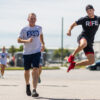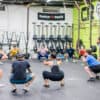The single greatest thing a weightlifter can do is to learn how to make their own adjustments.
Early on in a weightlifters career, the coach acts to guide the athlete into how they should feel, and how it should look, etc. This is one of the most important jobs a coach can have. The coach should give immediate feedback before, during, and after each attempt or set. This only will accelerate the learning process and will continue to funnel the lifters education into deeper and more detailed aspects of the sport.
As the lifter becomes more and more proficient with the technical aspects of weightlifting, it is their job to make the necessary adjustments that will result in success on the platform. Of the many hats that coaches wear, the technique of a weightlifter begins to become less and less of the coaches investment. This should not be thought of as a negative, but a positive that the athlete has developed proficiency and has learned how to make adjustments and corrections on their own!
Too often, I see coaches over-coaching. Sometimes, the best thing a coach can do is to stand back and let the lifter learn. As coaches, let the lifter perform a rep, make a correction, and perform it again better. Positively reinforce the correction—not just what the lifter did better, but that they actively tried to do something different than what they did before. Even if it was still incorrect, it was still an attempt to fix the issue- showing investment into one owns success. This should always be commended and will encourage the lifter to continue to make adjustments with confidence.
On the other side of the platform, too often I see lifters incorrectly perform a rep, then incorrectly perform another rep without making any adjustments or attempting to change anything, but hoping it would be better.
Isn’t that the definition of insanity? Doing the same thing expecting different results…
As lifters, we need to understand that every day will bring new variables. Weightlifters are constantly fighting neuromuscular fatigue, muscular tightness, variations in load, volume, etc. To expect that every day is going to be the same is absurd—So we shouldn’t expect to DO the same.
For example, fatigue will bring about changes in technique as we attempt to work around it. The timing of the lift will constantly be changing because the legs and back are tired, so pulling from the floor to the hip may take a split second longer. Instead of continuing to snatch with the same tempo and timing that you use when you are fresh, make an adjustment! Think less about time and more about position of the body and barbell.
There are tons more of examples that you will face throughout your daily training sessions. The great thing about weightlifting is that the barbell gives us constant feedback. If you don’t like the way the barbell moved on that rep, fix it. If your coach did his or her job, and you’ve invested into their words and actions, you will have an idea on how to do that.
Lastly, it takes years to properly develop the ability to correctly make large and detailed adjustments. But, you should always be invested enough to try. Start early- don’t wait for your coach to tell you everything. Experiment and take notice on how you feel when you perform a movement—
This includes:
Where is the pressure in your feet during all phases of the lift? What happens when you change the pressure?
Where did you make contact with the barbell?
How was the barbell moving as you transitioned underneath it?
Where are you physically tired? Your back, your legs, your brain?
Did you have to take steps after the lift was finished?
Did the barbell crash on you or were you able to meet it efficiently?
If you can’t answer some of these questions ask your coach to further your knowledge so that one day you will have a better understanding. Take video and compare what you felt with what it looked like from multiple angles.
The problem is not ignorance—the problem is knowing, but not doing anything about it.
If you don’t know, it could be your coach’s fault—If you know but are still making the mistakes, it could be your fault.
Take ownership, learn and adjust!
Phil Sabatini
M.S., C.S.C.S., USAW
Lecturer of Exercise Science
Old Dominion University
Human Movement Sciences
Phil is a former national champion and long time member of East Coast Gold Weightlifting. He is the Head Coach of the Barbell Syndicate at CrossFit Rife






